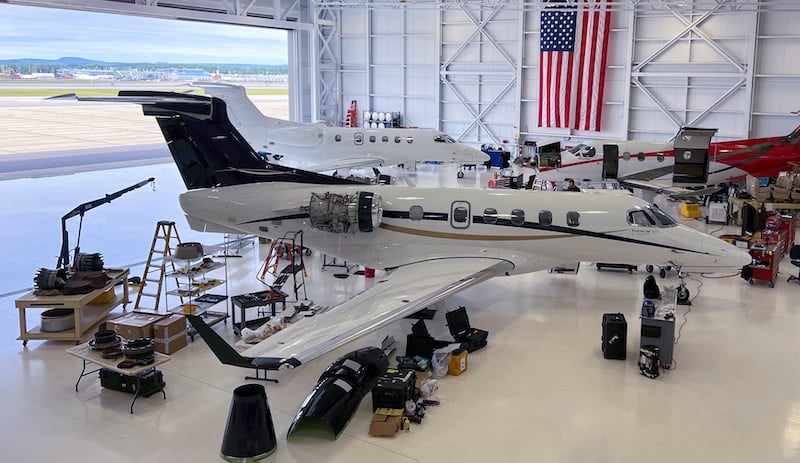Click Here to View This Page on Production Frontend
Click Here to Export Node Content
Click Here to View Printer-Friendly Version (Raw Backend)
Note: front-end display has links to styled print versions.
Content Node ID: 408458
Since adding to its authorized service center credentials through Embraer last year, Pro Star Aviation is seeing a robust business, especially servicing the Brazilian airframer’s light jets. “We’ve really hit the market pretty good with the Phenoms,” Pro Star general manager Sean Peterson told AIN. “So it’s been a pretty good start for us.”
The addition of Embraer to the New Hampshire-based MRO provider’s OEM service authorizations—which also includes Pilatus's PC-12 and PC-24—is one of the ways the company is looking to continue its growth. Pro Star is also an avionics and cabin management systems dealer and installer for the likes of Honeywell, Collins Aerospace, and Gogo. Avionics installation is a “big part” of Pro Star’s business, Peterson said, and includes the company’s “On The Fly” service in which it will travel to a customer’s site for avionics installation.
Located at Manchester-Boston Regional Airport (KMHT), Pro Star operates from 74,500 sq ft of facilities including 25,000-sq-ft and 15,000-sq-ft hangars for maintenance and avionics work. The company recently hired five technicians, pushing its employee count to 60, and efforts are underway to recruit five additional technicians, in part to bolster its AOG support of Pilatus and Embraer customers. An FAA Part 145 repair station, Pro Star has received a Class 4 repair rating, allowing it to work on aircraft weighing more than 12,500 pounds. “It’s a pretty big privilege for a company of our size,” Peterson explained, adding most Class 4 providers are much larger MROs. “It gives us a lot of agility when it comes to providing aircraft maintenance and repair.”
While it provides authorized service for Embraer and Pilatus aircraft, the company has a secondary focus on inspection, maintenance, and repair of Hawker and Bombardier Challenger 600 twinjets.

The third segment of Pro Star’s business is special missions modifications and developing supplemental type certificates (STCs) through its engineering department, which has organization designation authorization and designated engineering representative approval for electrical systems. Supporting that work and its maintenance activity is a 4,500-sq-ft machine shop with five- and three-axis CNC machines and parts manufacturer approval. Peterson said most of its STCs are for modification of civil aircraft. With these capabilities, Pro Star is early in the process of not only developing STCs but planning to manufacture the kits that go along with the STCs. “That’s one of my future goals, is to develop that strategy,” added Peterson.
STC kits are only one part of Pro Star’s future planning. The company also has a parcel of land at MHT that it is in the process of talking with airport officials about building another hangar, “essentially looking to double our hangar space,” he said. “That’s probably going to happen within the next two years.”
Peterson also envisions expanding its AOG capabilities with a dedicated team whose work hours are not incorporated into Pro Star’s capacity planning.
And lastly, the company is closely watching the development of drones and advanced air mobility. While it’s too soon to make definitive plans for serving that segment of aviation because of the nascent technology and regulation to follow, “we want to position ourselves to be a service center for those types of vehicles at some point,” Peterson said. “We just want to be innovators, to tap into that.”